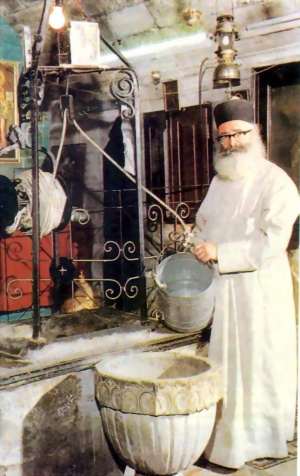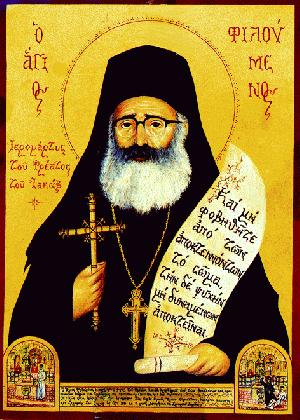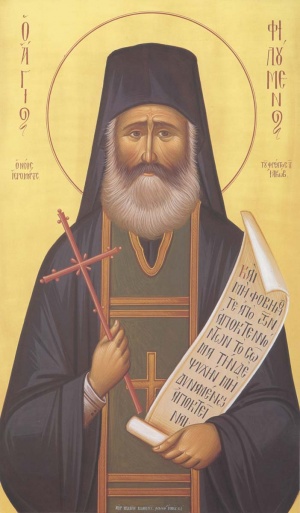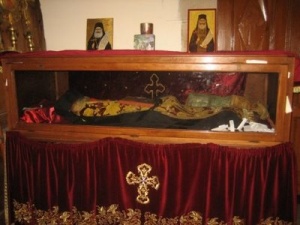Difference between revisions of "Philoumenos (Hasapis) of Jacob's Well"
m (link) |
(add note) |
||
| Line 45: | Line 45: | ||
On November 17/30, Patriarch [[Diodoros I (Karivalis) of Jerusalem|Diodorus of Jerusalem]], accompanied by various Greek bishops, archimandrites, clergymen and monastics, opened the grave. The coffin was reverently removed from its grave in the cemetery of the [[Brotherhood of the Holy Sepulcher]] on Mount Sion, and, when the shroud was lifted off, the [[relics]] were found to be substantially incorrupt. The remains were rinsed with wine, and then wrapped in a sheet. A short [[Memorial Services|requiem service]] was then chanted.<ref name="ALL SAINTS"> His body was then placed in a glass shrine in the northern part of the sacred Holy Altar in Mount Zion.<ref group="note">In the seminary chapel of the [[Church of Jerusalem|Patriarchate of Jerusalem]].</ref><ref name="NOCTOC"/> | On November 17/30, Patriarch [[Diodoros I (Karivalis) of Jerusalem|Diodorus of Jerusalem]], accompanied by various Greek bishops, archimandrites, clergymen and monastics, opened the grave. The coffin was reverently removed from its grave in the cemetery of the [[Brotherhood of the Holy Sepulcher]] on Mount Sion, and, when the shroud was lifted off, the [[relics]] were found to be substantially incorrupt. The remains were rinsed with wine, and then wrapped in a sheet. A short [[Memorial Services|requiem service]] was then chanted.<ref name="ALL SAINTS"> His body was then placed in a glass shrine in the northern part of the sacred Holy Altar in Mount Zion.<ref group="note">In the seminary chapel of the [[Church of Jerusalem|Patriarchate of Jerusalem]].</ref><ref name="NOCTOC"/> | ||
| − | Hieromartyr Philoumenos was ranked among the [[Saints]] of the [[Church of Jerusalem]] on [[August 17]]/30, 2008, and from that time, his incorrupt body was transferred to the pilgrimage site of Saint [[Jacob's Well]] where he had found martyrdom for the love of [[Jesus Christ|Christ]].<ref name="NOCTOC"/> | + | Hieromartyr Philoumenos was ranked among the [[Saints]] of the [[Church of Jerusalem]] on [[August 17]]/30, 2008, and from that time, his incorrupt body was transferred to the pilgrimage site of Saint [[Jacob's Well]] where he had found martyrdom for the love of [[Jesus Christ|Christ]].<ref name="NOCTOC"/><ref group="note">''Notes on Arab Orthodoxy (blogspot). "[http://araborthodoxy.blogspot.com/2009/12/new-hieromartyr-philomenos.html The New Hieromartyr Philoumenos]." Sunday, December 6, 2009.'')<br> |
| + | ''The following is translated from the website of the [http://www.archorthotripoli.org/ Archdiocese of Tripoli].''<br> | ||
| + | :Nablus (30.11.2009)—Yesterday, at the Orthodox Church of Jacob’s Well in Nablus the beatification of the martyr Philoumenos and the placing of his name in the Synaxarion of saints of the Orthodox Church was officially announced by the Holy Synod. His Beatitude the Patriarch [[Theophilus III (Giannopoulos) of Jerusalem|Theophilus III]] presided at the Divine Liturgy, along with the bishops of the [[Church of Jerusalem|patriarchal see of Jerusalem]] and a number of bishops from the [[Church of Cyprus]], in addition to a delegation from the [[Church of Russia|Russian Church]]. The relics of the saint are preserved in the church in which he was martyred. During the [[Divine Liturgy]], the decision of the Holy Synod to place the martyr Archimandrite Philoumenos in the [[w:Synaxarium|Synaxarion]] was officially announced. His annual commemoration will be [[November 29]], the anniversary of his martyrdom.</ref> | ||
His memory is honored on [[November 16]]/29, especially in the Holy [[Metropolis of Morphou]] of the [[Church of Cyprus]], and the community of Orounta, which observes an all-night long church service in memory of the martyr Saint Philoumenos the New.<ref name="NOCTOC"/> | His memory is honored on [[November 16]]/29, especially in the Holy [[Metropolis of Morphou]] of the [[Church of Cyprus]], and the community of Orounta, which observes an all-night long church service in memory of the martyr Saint Philoumenos the New.<ref name="NOCTOC"/> | ||
Revision as of 03:43, July 22, 2010


New martyr Archimandrite Philoumenos (Hasapis)[note 1] (Greek: Π. Φιλουμενος ο Κυπριος , also Π. Φιλουμενος Ορουντιωτης ), October 15, 1913 - November 16, 1979, was the Igumen of the Greek Orthodox monastery of Jacob's Well near the city of Samaria, now called Nablus (Neapolis), in the West Bank. He was glorified by the the Patriarchate of Jerusalem on August 17/30, 2008, and is commemorated by the Church on November 16/29.[note 2]
The life of Father Philoumenos is an example that martyrdom for Christ is not of the past from the Roman Empire or Communist times, but is a reality even in our own day.[1]
Contents
Life
Saint Philoumenos came from the village of Orounta in the province of Morphou, Cyprus. The neomartyr was born in 1913 to George and Magdalene Hasapis, along with his twin brother Archimandrite Elpidios. Even though his parents came from the village of Orounta, they lived at the parish of St. Savvas in Nicosia, since his father had his own inn and bakery there.[2]
From a young age, he and his brother Elpidios showed a special zeal for the sacred Scriptures of Christ, being inspired in particular by their grandmother Loxantra, who aside from their mother, influenced them in learning the ways of the Church and developing a truly Orthodox conscience.[2]
Together with his brother Elpidios, they showed a strong enthusiasm for prayer, read the lives of the Saints, and learned the hymns of the Church. In particular they where touched by the life of Saint John the "Kalyvitis", who in some way made an impact on them, to the point of inspiring them to want to follow the life of monks.
At the age of 14, the two brothers left for the ancient Monastery of Stavrovouni, founded by the Empress St. Helen, and stayed there for five years.[2]
In the Holy Land
Afterwards, they both left for Jerusalem, where they attended High School. Upon finishing High School in 1939, Father Elpidios served as a priest in different places, eventually leaving for Mount Athos,[note 3], while Father Philoumenos joined the monastic Brotherhood of the Holy Sepulcher in Jerusalem.[1]
His spiritual son, the Monk Yeghia[note 4] wrote these reminiscences of his father in Christ:
- Father Philoumenos used to tell me about his years in Bethlehem, where the bishop disapproved of education for monks lest they be tempted to the priesthood. But because of his zeal for the neglected souls of the Palestinian faithful, Father Philoumenos studied to become fluent in Arabic, both literary and conversational, chanting the Holy Gospel more easily than many Arabs, and preaching the Orthodox faith not only in their language but in his Orthodox manner of life. What a good shepherd he was, more worthy than some of the episcopate! Yet the policies and needs of the patriarchate saw Father Philoumenos assigned to other positions. Whenever Palestinian faithful were scandalized by some unworthy priest, whenever Orthodox neglect or European money drove the faithful to wonder whether they would not receive better pastoral care from Uniates, it was Father Philoumenos that the Patriarch of Jerusalem sent as the true defender of the Faith, a man of more than blameless life, a man from whom no one could even imagine any immodest or improper word, a man whose faith and integrity were a model for all.[3]
- Three things were most remarkable about the blessed martyr. The first might have been partly from nature, but assuredly aided by Grace: this was his soft sweet voice, which I can still hear today. The second was a meticulous fidelity to small things, but specifically to the Divine Service. He never omitted one word of any day's service. When we were alone in some remote monastery, particularly for Matins, he slowly and carefully chanted each word of every psalm and canon. Not even at the Monastery of St. Sabba was the reading done so well. But when there were pilgrims for the Divine Liturgy and vespers, he made the usual abridgements lest the service be too long and some be tempted to leave. Later on, privately, he would read every word that had not been chanted in the church. Those who stayed with him for some time saw the copies of the menaion, horologion, synaxarion, etc. and noticed that the markers were always in place and the volumes never dusty, which earned the Divine Promise, Well done thou good and faithful servant, because thou hast been faithful over little things, I will set thee over great things Enter thou into the joy of the Lord (Matt. 25:21). Third, and as unobtrusive, almost secret, was his humility.[3]
In 1979 Saint Philoumenos was appointed guardian of the Monastery of Saint Jacob's Well.[2]
Martyrdom
The crowning moment of Father Philoumenos’ earthly pilgrimage came on November 16/29, 1979 at the shrine built on the site of Jacob's Well. The Saint experienced a martyric death at the hands of extremist Jewish Zionists who massacred him with an ax in the evening, while he was performing Vespers at the Well of Jacob where he lived as a loyal guardian of the Holy Places and centuries old way of life.[2]
The week before his martyrdom, a group of fanatical Zionists had come to the monastery at Jacob's Well, claiming it as a Jewish holy place and demanding that all crosses and icons be removed. Of course, the Saint pointed out that the floor upon which they were standing had been built by Emperor Constantine before 331 A.D. and had served as an Orthodox Christian holy place for sixteen centuries before the Israeli State was created, and had been in Samaritan hands eight centuries before that.[note 5] The group left with threats, insults and obscenities of the kind which local Christians suffer regularly.[2]
After a few days, on November 16/29, 1979, during a torrential downpour, a group broke into the monastery. The saint had already put on his epitrachelion for Vespers.
- "They burst into the monastery and with a hatchet butchered Archimandrite Philoumenos in the form of a cross. With one vertical stroke they clove his face, with another horizontal stroke they cut his cheeks as far as his ears. His eyes were plucked out. The fingers of his right hand were cut into pieces and its thumb was hacked off. These were the fingers with which he made the sign of the Cross. The murderers were not content with the butchering of the innocent monk, but proceeded to desecrate the church as well. A crucifix was destroyed, the sacred vessels were scattered and defiled, and the church was in general subjected to sacrilege of the most appalling type."[4]
The piecemeal chopping of the three fingers with which he made the Sign of the Cross showed that he was tortured in an attempt to make him renounce his Orthodox Christian Faith.[note 6][2]
The body of the Saint was handed over to the Orthodox 6 days after his massacre, but retained its flexibility and was buried in the cemetery of Mount Zion.[2] Saint Philoumenos served in the Holy Land for 46 years (1933-1979).
Glorification
After four years his body was exhumed, as is customary among Greek monks. It was found to be substantially incorrupt and had the smell of a beautiful scent. Then the tomb was closed and was reopened during the Christmas season of 1984.[2]
On November 17/30, Patriarch Diodorus of Jerusalem, accompanied by various Greek bishops, archimandrites, clergymen and monastics, opened the grave. The coffin was reverently removed from its grave in the cemetery of the Brotherhood of the Holy Sepulcher on Mount Sion, and, when the shroud was lifted off, the relics were found to be substantially incorrupt. The remains were rinsed with wine, and then wrapped in a sheet. A short requiem service was then chanted.Cite error: Closing </ref> missing for <ref> tag[2]
Hieromartyr Philoumenos was ranked among the Saints of the Church of Jerusalem on August 17/30, 2008, and from that time, his incorrupt body was transferred to the pilgrimage site of Saint Jacob's Well where he had found martyrdom for the love of Christ.[2][note 7]
His memory is honored on November 16/29, especially in the Holy Metropolis of Morphou of the Church of Cyprus, and the community of Orounta, which observes an all-night long church service in memory of the martyr Saint Philoumenos the New.[2]
The Lord has seen fit to allow our generation of Christians to have martyrs of its own. It is without a doubt that the blood of murdered Orthodox Christians such as Archimandrite Philoumenos in the Holy Land, Hieromonk Vasily and the two Optina monks in Russia and Brother Jose Munoz in the West, is today’s "seed", which is ripening and will produce a harvest in Christ's Vineyard.[5]
Troparia
- TROPARION (Tone 3)
- Vanquisher of daemons,
- dispeller of the powers of darkness,
- by thy meekness thou hast inherited the earth
- and reignest in the Heavens;
- intercede, therefore, with our Merciful God,
- that our souls may be saved.[4]
- TROPARION (Tone 4)
- At Jacob's Well you were proved well named:
- loving Christ, confessing Him, pouring out your sacred blood.
- Being faithful in small things you were set over great.
- Worshipping in Spirit and in Truth,
- you are now Guardian of the Holy Places forever.[1]
Apolytikion, Kontakion, Megalynarion (Greek)
- Απολυτίκιο. Ήχος α΄. Της ερήμου πολίτην.
- Της Ορούντης τον γόνον,
- νήσου Κύπρου του βλάστημα και ιερομάρτυρα νέον Ιακώβ θείου Φρέατος,
- Φιλούμενον τιμήσωμεν, πιστοί, ως πρόμαχον της πίστεως ημών,
- και αήττητον οπλίτην Χριστού της αληθείας, πόθω κράζοντες
- δόξα τω σε δοξάσαντι Χριστώ,
- δόξα τω σε αφθαρτίσαντι,
- δόξα τω σε ημίν χειραγωγόν προς πόλον δείξαντι!
- Κοντάκιο. Ήχος πλ. δ΄. Τη Υπερμάχω.
- Τον ανατείλαντα ως άστρον νεαυγέστατον τη Εκκλησία του Χριστού αρτίως μέλψωμεν,
- μαρτυρίου ταις ακτίσι και θαυμασίων ταις βολαίς νεοφανέντα ιερόαθλον,
- ού ηφθάρτισε το σκήνωμα ο Ύψιστος,
- πόθω κράζοντες χαίροις,
- μάκαρ Φιλούμενε.
- Μεγαλυνάριο.
- Χαίροις, της Ορούντης σεπτός βλαστός,
- χαίροις, νήσου Κύπρου πολυτίμητος θησαυρός,
- χαίροις, Εκκλησίας της Μόρφου ωραιότητης,
- Φιλούμενε, μαρτύρων νέων υπόδειγμα![6]
See also
Notes
- ↑ Of Father Philoumenos' surname, his spiritual son Monk Yeghia Yenovkian writes that he was "Born to the pious Cypriot family of Hasapis". In a Greek source, published in August 2004 which deals with modern saints of the Orthodox Church, Fr. Philoumenos is referred to in a brief biographical entry as "Orountiotis" however; this latter term in the Greek refers to his place his origin (i.e. "of the village of Orounta") and not to his surname.
- ↑ Father Philoumenos' was martyred on his Name day, November 29th (Old Style), which is also the feast of the 3rd century martyrs Paramon and Philoumen (ca. AD 270).
- ↑ Archimandrite Elpidios died on November 29, 1983.
- ↑ Rev. Fr. Hieroschemamonk Elia (Yenovkian) (Synod of Milan), Igumen of Paradise Palestinian Hermitage, Ellisville, Mississippi.
- ↑ The rest of the original church had been destroyed by the invasion of Shah Khosran Parvis in the early seventh century, at which time the Jews massacred all the Christians of Jerusalem.
- ↑ It was later determined that the person that did the actual murder was an American Jew. Instead of being imprisioned for this criminal act by the Israeli government, he was merely deported back to the U.S. where he freely walks the streets. (OrthodoxChristianity.net. December 04, 2002. (Online Forum).
- ↑ Notes on Arab Orthodoxy (blogspot). "The New Hieromartyr Philoumenos." Sunday, December 6, 2009.)
The following is translated from the website of the Archdiocese of Tripoli.
- Nablus (30.11.2009)—Yesterday, at the Orthodox Church of Jacob’s Well in Nablus the beatification of the martyr Philoumenos and the placing of his name in the Synaxarion of saints of the Orthodox Church was officially announced by the Holy Synod. His Beatitude the Patriarch Theophilus III presided at the Divine Liturgy, along with the bishops of the patriarchal see of Jerusalem and a number of bishops from the Church of Cyprus, in addition to a delegation from the Russian Church. The relics of the saint are preserved in the church in which he was martyred. During the Divine Liturgy, the decision of the Holy Synod to place the martyr Archimandrite Philoumenos in the Synaxarion was officially announced. His annual commemoration will be November 29, the anniversary of his martyrdom.
References
- ↑ 1.0 1.1 1.2 Very Rev. Fr. Edward Pehanich. Father Philoumenos of Jacobs Well 1913-1979. In: The Church Messenger, American Carpatho-Russian Orthodox Diocese of the U.S.A. Volume LXIV, Number 1, January 27, 2008. Page 7.
- ↑ 2.00 2.01 2.02 2.03 2.04 2.05 2.06 2.07 2.08 2.09 2.10 2.11 NOCTOC: Ο Κύπριος Άγιος Φιλούμενος που κατακρεούργησαν οι σιωνιστές Εβραίοι το 1979-The Cypriot Saint Philoumenos who was massacred by Zionist Jews in 1979. Saturday, November 29, 2008.
- ↑ 3.0 3.1 Monk Yeghia Yenovkian Paradise Palestinian Hermitage, Ellisville, Mississippi. Tribute to a New Martyr - Our Holy Father Philoumenos of the Brotherhood of the Holy Sepulchre . Martyred at Jacob's Well, 16/29 November, 1979. In: Orthodox America, 1994.
- ↑ 4.0 4.1 All Saints of North America Russian Orthodox Church. Holy Hieromartyr Philoumenos.
- ↑ Western American Diocese: Russian Orthodox Church Outside Russia (News Archive). The 10th Anniversary of Brother Jose's Repose is Marked in San Francisco. October 31, 2007.
- ↑ Θεοδωρος Ι. Ρηγινιωτης. Σύγχρονοι άγιοι και όσιοι στην Ορθόδοξη Εκκλησία. Αυγουστος 2004. Page 60.
Sources
- All Saints of North America Russian Orthodox Church. Holy Hieromartyr Philoumenos.
- Blackwell Reference Online. Philoumenos.
- KATHIMERINI (English Edition). Orthodox oasis in West Bank. Monday September 11, 2006.
- Monk Yeghia Yenovkian Paradise Palestinian Hermitage, Ellisville, Mississippi. Tribute to a New Martyr - Our Holy Father Philoumenos of the Brotherhood of the Holy Sepulchre . Martyred at Jacob's Well, 16/29 November, 1979. In: Orthodox America, 1994.
- Very Rev. Fr. Edward Pehanich. Father Philoumenos of Jacobs Well 1913-1979. In: The Church Messenger, American Carpatho-Russian Orthodox Diocese of the U.S.A. Volume LXIV, Number 1, January 27, 2008. Page 7. ISSN 0734–0036
- Western American Diocese: Russian Orthodox Church Outside Russia (News Archive). The 10th Anniversary of Brother Jose's Repose is Marked in San Francisco. October 31, 2007.
Greek sources
- Θεοδωρος Ι. Ρηγινιωτης. Σύγχρονοι άγιοι και όσιοι στην Ορθόδοξη Εκκλησία. Αυγουστος 2004. pp. 40,60.
- NOCTOC: Ο Κύπριος Άγιος Φιλούμενος που κατακρεούργησαν οι σιωνιστές Εβραίοι το 1979-The Cypriot Saint Philoumenos who was massacred by Zionist Jews in 1979. Saturday, November 29, 2008.
Categories > Church History
Categories > Church History
Categories > Church History
Categories > Church History
Categories > Liturgics > Feasts
Categories > Liturgics > Feasts
Categories > Liturgics > Feasts
Categories > Liturgics > Feasts
Categories > People > Monastics
Categories > People > Monastics > Elders
Categories > People > Saints
Categories > People > Saints > Greek Saints
Categories > People > Saints > Martyrs
Categories > People > Saints > Modern Saints
Pages with reference errors

